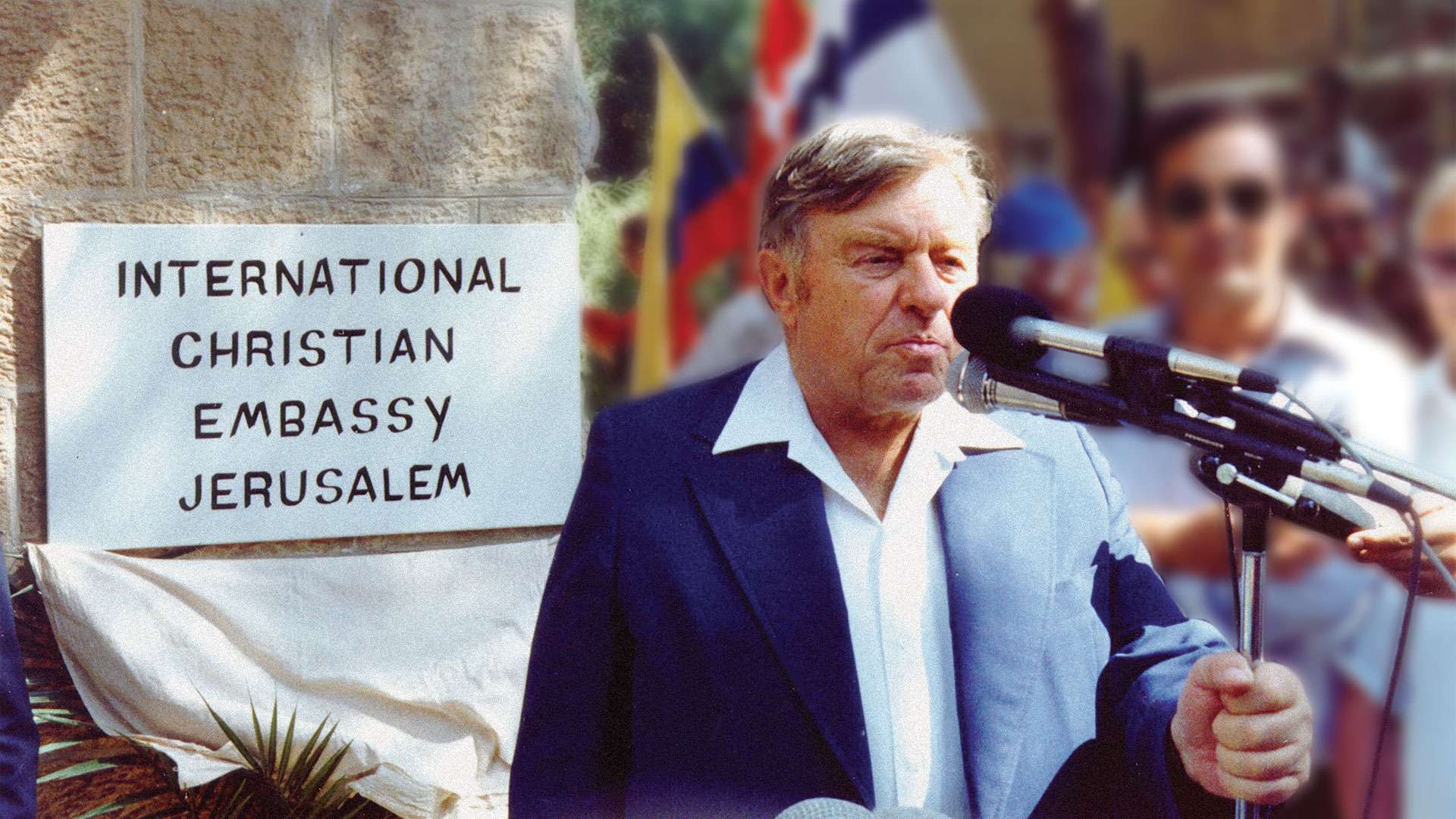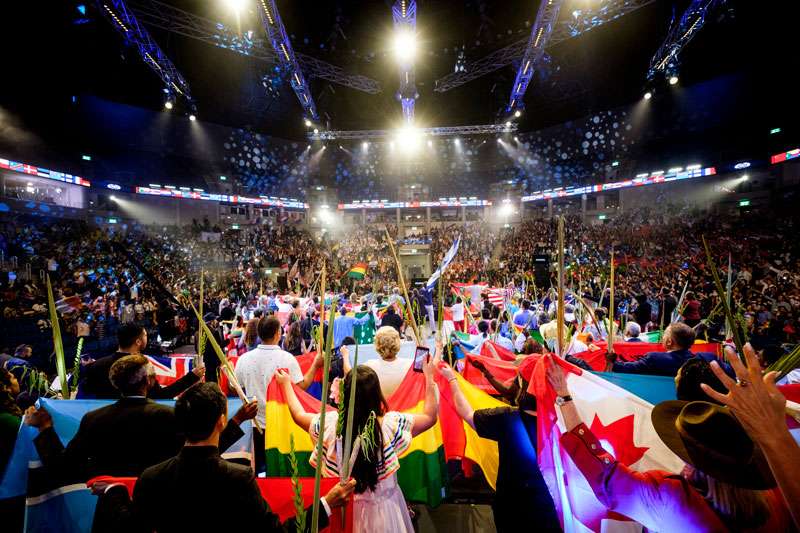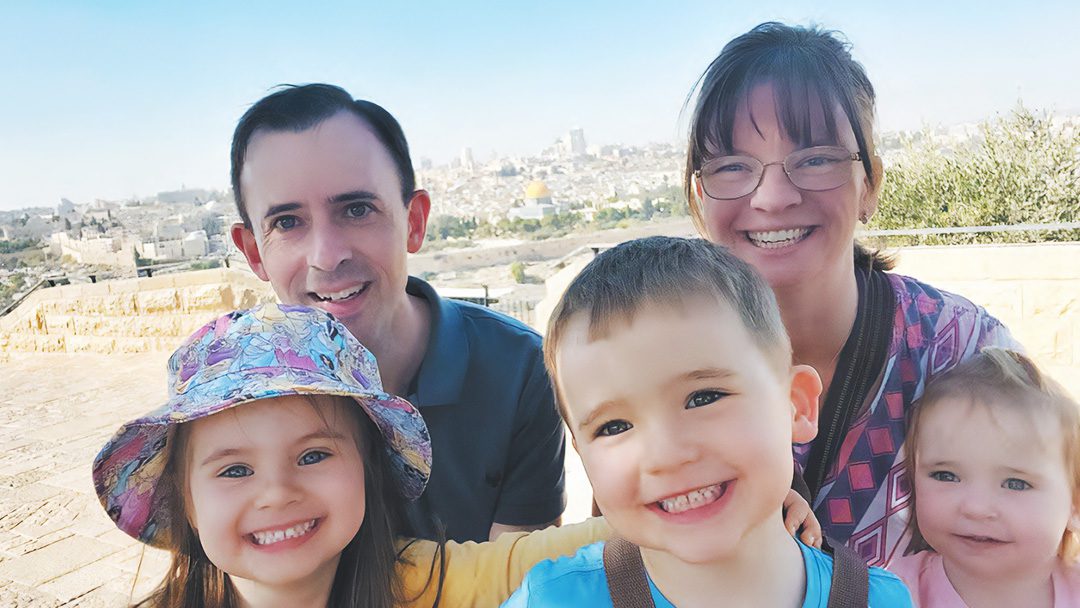The frail, temporary shelters that are seen on balconies, parking spaces, and even streets throughout Israel during the Festival of Tabernacles, Sukkot, have a powerful message. It is not circumstances, or material security that are our protection, but the God of Israel. He demonstrated His love and care for His people while they lived in temporary shelters during their sojourn in a harsh wilderness, to which the yearly sukkas [shelters], point back. He demonstrated it when against all odds, the restored, but tiny, fledgling nation survived the might of its neighbours and has since continued to experience Divine protection many times.
As well as the reminder of where our security lies, Tabernacles is a glorious reminder of God dwelling with His people. “And let them make me a sanctuary; that I may dwell among them,” God instructed Moses in Exodus 25:8, and despite their failings, His presence never left them. It was an impressive picture of what was to come. John 1:14 can be translated: “The Word became flesh and tabernacled among us.” And in Revelation 21:3-4, John records a wonderful promise that waits for the end of days, “And I heard a loud voice from heaven saying, “Behold, the tabernacle of God is with men, and He will dwell [tabernacle] with them, and they shall be His people. God Himself will be with them and be their God….”
There are other aspects to this festival. It follows the Days of Awe, ten intense days of prayers for forgiveness which culminate in the Day of Atonement, so the seven days of Sukkot are joyful celebrations of trust in God. It coincides with the end of the agricultural cycle, the final harvest which in Biblical Israel was a cause of celebration, hence it is also known as the Festival of the Ingathering. No wonder the rabbis call it – ‘The Season of Our Rejoicing’ (in Hebrew, z’man simchateinu’).

The Third Unknown Feast
“And it shall come to pass, that every one that is left of all the nations which came against Jerusalem shall even go up from year to year to worship the King, the LORD of hosts, and to keep the feast of tabernacles.” – Zechariah 14:16.
However, for most of its history, the church knew of Passover and Feast of Weeks (Pentecost), but Sukkot was largely ignored. A group of international Christians living in Jerusalem in the 70’s who met together to pray, wanted the Church to understand this third great feast. Among the group was a couple from Canada who were internationally acclaimed musicians with extraordinary talent and vision. Merv and Merla Watson were uncertain how Gentiles should celebrate this Biblical feast, so they asked the advice of a senior Rabbi in Israel.
After receiving his guidance and were about to leave, he called them back. “Mr and Mrs Watson”, he said, “that you, as gentiles, came here to ask me how to celebrate Sukkot is quite unusual. Our prophets declare that in the Messianic times, all gentiles will come to Jerusalem to celebrate this feast with us. When you asked me today how to celebrate Sukkot, I am hearing the footsteps of Messiah, that he is coming.”
While the Feast organizing committee was preparing for this historic celebration, a storm was brewing. The Israeli government declared Jerusalem as the eternal capital of the Jewish state. Threats were issued from the Arab oil producing countries. Withdraw your Embassies from Jerusalem or face an oil embargo.
By the time 1,000 Christians from 22 countries showed up in Jerusalem for that first Feast, 13 national embassies had left the city for Tel Aviv.
In response to the speedy abandonment by the nations, the Feast organizers decided to establish a permanent expression of Christian support for Israel and its claim to Jerusalem.
History Made
The Christian celebrations commenced in September 1980 in the Anglican International School in Jerusalem. By the third day of that week-long biblical festival, a building had been located to serve as the new “International Christian Embassy Jerusalem”.
A dedication ceremony was presided over by Jerusalem’s venerable mayor Teddy Kollek who described it as one of the most moving experiences in his life. And Israel’s Chief Rabbi Shlomo Goren, blessed the Christian pilgrims with the traditional Feast greeting from Psalms 118:26—“Baruch ha’ba b’Shem Adonai / ’Blessed are those who come in the Name of the LORD.”
The Jerusalem March has become an extremely popular Feast event for Christian pilgrims and Israelis alike.
Thus, the founding group, Merv and Merla Watson, Jan Willem van der Hoeven, Johann Luckhoff, Timothy King and others, established ICEJ with a clear calling from Scripture to be a ministry of comfort and blessing to the restored nation of Israel, based on the mandate of Isaiah 40:1-2. “’Comfort, yes, comfort My people’! says your God…”
From its very beginnings, the ICEJ has lived out its mandate by bringing comfort to Israel through Aid and Aliyah programs. This journey has involved deeds of compassion impacting virtually every town, village, and city in some way, touching the lives of people from all walks of life in Israel by contributing to projects across the nation in every sector of society.
Forward in Faith
The next year’s Feast to be held in Jerusalem’s Convention Centre was a huge step in faith. ICEJ leadership in that first year of operation felt they should prepare for 3000 pilgrims, but as the time drew close there were only 160 reservations. “We all got down on our knees and prayed together,” relates Timothy King one of the original founders. “Clearly, God answered and confirmed our thoughts. And all at the last minute, 3000 people registered.”
That year, the Feast was visited by the Prime Minister of Israel for the first time. He was greeted with thunderous applause and although Menachem Begin was not a man who readily smiled, that night he did, especially as he heard the words, ‘Israel you are not alone!’
Israel You are Not Alone
Although the Christian visitors had been invited to join the Jerusalem March in 1980, the ‘walls’ between Jews and Christians were high. The experiences of the Holocaust, still raw. However, when in 1981 the press reported that the Prime Minister, Mayor and Chief Rabbi had welcomed the pilgrims, residents were curious to investigate these Christian visitors.
Tim King remembers, “As we Christians walked down the street with our banners of love, you could see faces with this look of, ‘maybe, just maybe, these Christians are different’. For 41 years, the walls have steadily come down, and the term ‘Evangelical Christian’ has almost become a ‘good household word’ in Israel.”
Through lack of interest, City officials had considered cancelling the Jerusalem March which had begun in the early 1970s. Yet once the Christian delegations started joining this yearly event, the March became an attraction again. And the following year in 1982, with the nation anxious about the fighting in Lebanon and facing heavy criticism abroad, thousands of friendly Christians marching through the streets of Jerusalem at Sukkot was an incredibly uplifting sight.
Ever since, the Jerusalem March has become an extremely popular Feast event for Christian pilgrims and Israelis alike.
A Temple of Worship in the City of the Great King
“All the ends of the world shall remember and turn to the LORD, And all the families of the nations shall worship before You.” – Psalm 22:27
Worship has been an important and inspiring hallmark of the Feast. From all over the world, the LORD provided rich talent, and many singers who later became well known names were first given an international platform at the Feasts. Anointed new expressions of praise and worship were introduced by Merv and Merla Watson. Worship through dance, and colourful banners and biblically inspired garments for the musicians and choristers, contributed to a sense of Davidic praise.
There to Stay
The celebration of the Feast has continued for four decades. It grew to become the single biggest tourist event on Israel’s Calendar—with thousands of Christians descending upon Jerusalem for the 7 day feast. Each year, the Prime Minister or other dignitaries have been in attendance in the opening night. Some years saw increased threats of conflict and terrorism, but the pilgrims came.
Would the scuds of the Gulf War of early 1991 that required the Israeli population to carry gas masks at all times keep visitors away? Instead that year, there was a record crowd of nearly 8,000.
The 2002 Feast was held during the peak of the armed Palestinian uprising, which had chased away nearly all foreign tourism to Israel. There was a serious warning of a suicide bomber in Jerusalem to target the March but the nearly 3000 Christians who showed up for the Feast that year marched anyway. The demonstration of support and courage not only touched Israelis, but also gained respect from the global press.
2014 saw a war with Gaza and at the Feast that year, in it’s new larger location, the Embassy welcomed on stage 300 IDF troops who had fought in the conflict.
Calling the Nations to Come Up to Jerusalem
The original founders were aware that they were celebrating a feast of joy and thanksgiving and not just another Christian conference. Worship and teaching of the Word remain important aspects. However, there is another component. The Feast remains as a challenge to the Church to proclaim that “the time to favour Zion has come.”
The global pandemic begun in 2020 and continues to close borders, but technology has enabled borders to be crossed while sitting in our homes.
The International Christian Embassy Jerusalem invites you to join this year’s celebration from 20-26th September.
Enjoy worship and anointed speakers and go on virtual tours of Israel. Take the opportunity to introduce friends to Israel as you view the sessions together. The theme of the Feast this year is ‘The Days of Elijah’. This theme is introduced by Dr Jurgen Buhler President of ICEJ in an excellent article of which there is an extract below:
‘When Ahab finally met Elijah at the end of the drought, he greeted him: “Here you are, you troubler of Israel.” In our post-modern world of ‘woke culture’, where everything goes and no absolutes are allowed, it is the believer in the holy God of the Bible who is the modern trouble-maker.
A God who places radical demands upon His disciples is not compatible anymore with a world which defies absolutes and celebrates “openness,” “diversity,” and “inclusion.” But it is in exactly this time that Elijah’s voice needs to be heard again. To be clear, Elijah’s main calling was not to release judgement upon Israel, but it was the means to turn the hearts of his people back to her God. Elijah’s ministry—and after him that of Elisha (upon whom rested the spirit of Elijah)—brought forth one of the greatest seasons of signs and wonders in Israel. It was later only exceeded by the Messiah himself.
Both Elijah and Elisha demonstrated the miraculous power of God more than any other prophet before or after them. They raised the dead, healed the sick, defied laws of gravity, divided the river Jordan, multiplied food, blinded the eyes of the enemies, and opened the eyes of God’ people. It was a singular time when God revealed Himself to His people in unparalleled ways.
This was not a ministry of ‘cheap grace’, but one where God challenged His people to make up their minds whom they wanted to serve—the God of Israel or Baal. Jesus then announces that Elijah will come and he will “restore all things”. When Jesus said these words, I believe he did not have the Roman or Babylonian empires in mind, but his own people, the people of the Kingdom of God.
This means we can expect—even in the midst of turbulent times—for God to conclude His purposes with Israel and the Church!’ (Dr Buhler ‘Word From Jerusalem’ July/August Issue.)
Be challenged at the 2021 Feast along with a global audience!
For details visit: on.icej.org/FOT2021
(Thanks to Timothy King for his assistance.)














0 Comments